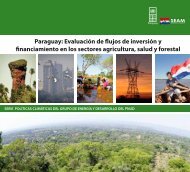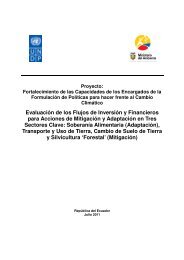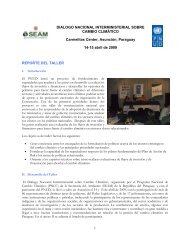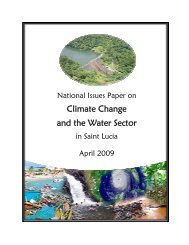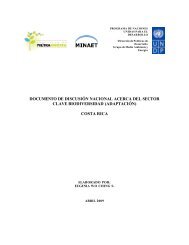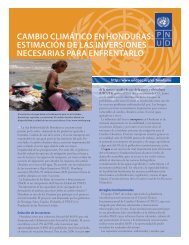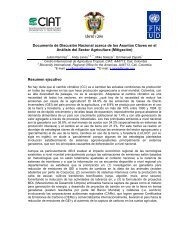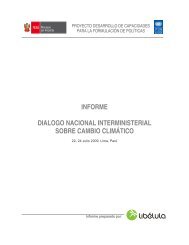national climate change awareness-raising workshop - UNDPCC.org
national climate change awareness-raising workshop - UNDPCC.org
national climate change awareness-raising workshop - UNDPCC.org
You also want an ePaper? Increase the reach of your titles
YUMPU automatically turns print PDFs into web optimized ePapers that Google loves.
• More <strong>national</strong> studies, e.g. <strong>national</strong> communications. Private sector also does modelling – in mining,<br />
which may have looked at <strong>climate</strong> <strong>change</strong> impacts<br />
• Strengthen institutional coordination. This would bring in policy makers to support stakeholders.<br />
• Capitalise on <strong>national</strong> competitive advantages and add value, e.g. fisheries, beef, create markets for<br />
game meat<br />
For all adaptation measures, participants stressed the need for improved <strong>awareness</strong> <strong>raising</strong> efforts. Climate<br />
<strong>change</strong> messages must relate to people in terms that are relevant to them and increased extension efforts are<br />
needed to reach people.<br />
Some efforts to reduce poverty are also linked to adaptation. For example, efforts to spread the risk of<br />
income loss by diversifying livelihoods options into sustenance crops, market crops and other sectors can<br />
lower vulnerability risks to <strong>climate</strong> <strong>change</strong> and decrease poverty.<br />
Technology<br />
Presentation by Mr. William Kojo Agyemang-Bonsu, UNFCCC/DNA Focal Point, Ghana<br />
Combating <strong>climate</strong> <strong>change</strong> will require improvements in all aspects of technology transfer—research,<br />
development, deployment, demonstration and diffusion. While investments in clean energy are growing fast,<br />
including new financial products and markets, there is a substantial financing gap for the required scaling up<br />
needed to address <strong>climate</strong> <strong>change</strong>. The most favoured technologies in recent years including: wind, solar,<br />
biofuels (renewables increasingly relevant), cleaner fossil fuels generation and (especially for Africa) energy<br />
efficient building and appliances. Carbon markets (including the CDM) can play important role for<br />
developing countries, although smaller and lower-income countries have yet to see benefits. Technology is a<br />
key modality for mitigation and adaptation, and is gaining momentum in the inter<strong>national</strong> negotiations.<br />
Developed countries are obligated to support transfer of technologies to developing countries under the<br />
Convention. The extent to which they can undertake both mitigation and adaptation will depend on this.<br />
Important aspects of the current discussion include the dissemination of technology information and<br />
networking, as well as strengthened research and capacity building. Key barriers can be financing, intellectual<br />
property rights and tariffs. A key future concern would be to consider not only developed country action, but<br />
also improvement to cooperative action so that countries can work together.<br />
Plenary discussion on technology<br />
Participants discussed possible problems with the sectoral approach to developing mitigation targets,<br />
particularly with regard to market restrictions. Some viewed this as a means of hindering development that<br />
could turn into a trade barrier, as it implies an inter<strong>national</strong> standard and their companies may not be able to<br />
compete in the market. Speakers stressed that technology transfer will require more training. Some thought a<br />
training component should be obligatory with any transfers. The discussion also focused on Namibia’s<br />
technology needs assessment (TNA), completed in 2005. The TNA identified priority technologies, including<br />
water and energy efficiency, as well as solar water heaters. Key barriers included insufficient <strong>awareness</strong>,<br />
social/cultural barriers and financial barriers. There was also a lack of institutional <strong>awareness</strong> on the CDM.<br />
7




